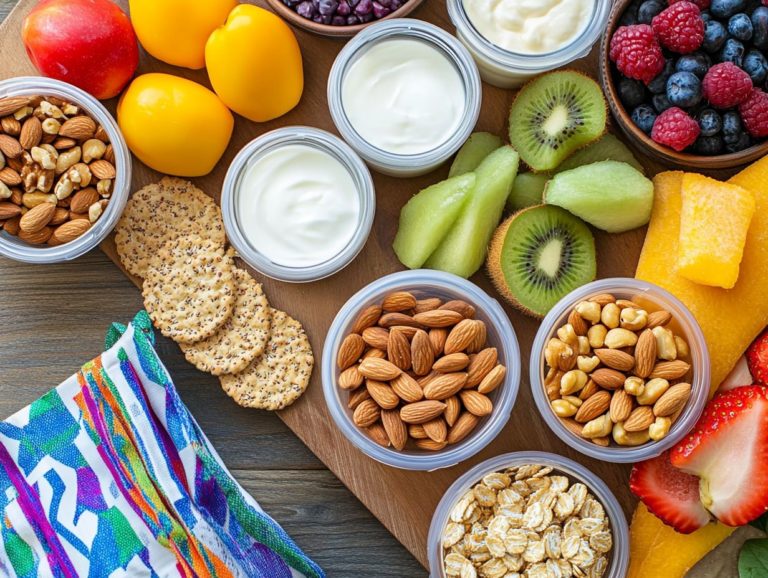The Science Behind Satiety: What to Know
Satiety plays a crucial role in your relationship with food. It shapes not only the quantity you consume but also your overall feelings about your meals.
By grasping the concept of satiety, you empower yourself to make healthier choices and manage your weight more effectively.
This article delves into the definition and significance of satiety, the hormones that regulate it, and the various factors that influence your sense of fullness.
Dive into practical strategies that can transform your relationship with food, along with an exploration of satiety’s vital role in weight management.
Immerse yourself in this journey to unlock the power of satiety for improved health!
Contents
- Key Takeaways:
- Understanding Satiety
- The Role of Hormones in Satiety
- Factors Affecting Satiety
- Ways to Increase Satiety
- The Connection Between Satiety and Weight Management
- Frequently Asked Questions
- What is satiety and why is it important to understand?
- What are some factors that influence satiety?
- How does the brain play a role in satiety?
- Is there a difference between physical and psychological satiety?
- Can certain foods increase satiety?
- How Can Understanding the Science Behind Feeling Full Help with Weight Management?
Key Takeaways:
Satiety is the feeling of fullness and satisfaction after eating, and is important for weight management.
- Hormones play a key role in regulating satiety, including leptin, ghrelin, and insulin.
- Incorporate fiber-rich foods, protein, and healthy fats into meals to enhance satiety. Practice mindful eating habits.
Understanding Satiety
Understanding satiety is essential for implementing effective weight loss strategies and achieving a sustainable calorie deficit.
Satiety, the satisfying feeling of fullness after a meal, plays a pivotal role in managing your caloric intake and controlling hunger. This is especially important in today’s obesity-driven landscape.
Research indicates that foods high in energy density and fiber significantly enhance satiety per calorie. This makes them critical for healthy weight loss meal planning.
By incorporating high-satiety foods into your diet, you can create a more gratifying eating experience that promotes your overall well-being.
Definition and Importance
Satiety is the sensation of fullness that follows a meal and significantly influences your food intake and dietary habits. This complex process involves how your body reacts to food.
Hormones play a crucial role in this process. For example, leptin, produced by fat cells, signals to your brain that you have stored enough energy, leading to a decrease in hunger. Conversely, ghrelin, often called the “hunger hormone,” urges you to eat when your stomach is empty.
Grasping these mechanisms is essential for maintaining a healthy weight. Opting for high-satiety foods, particularly those rich in protein and fiber, can help you lower your overall caloric intake. This makes it easier to sidestep unhealthy snacking and overeating.
The Role of Hormones in Satiety
Hormones are crucial for governing satiety, shaping your experience of hunger control and the sense of fullness you feel after meals. This intricate balance significantly influences your overall caloric intake and dietary choices.
Key Hormones Involved
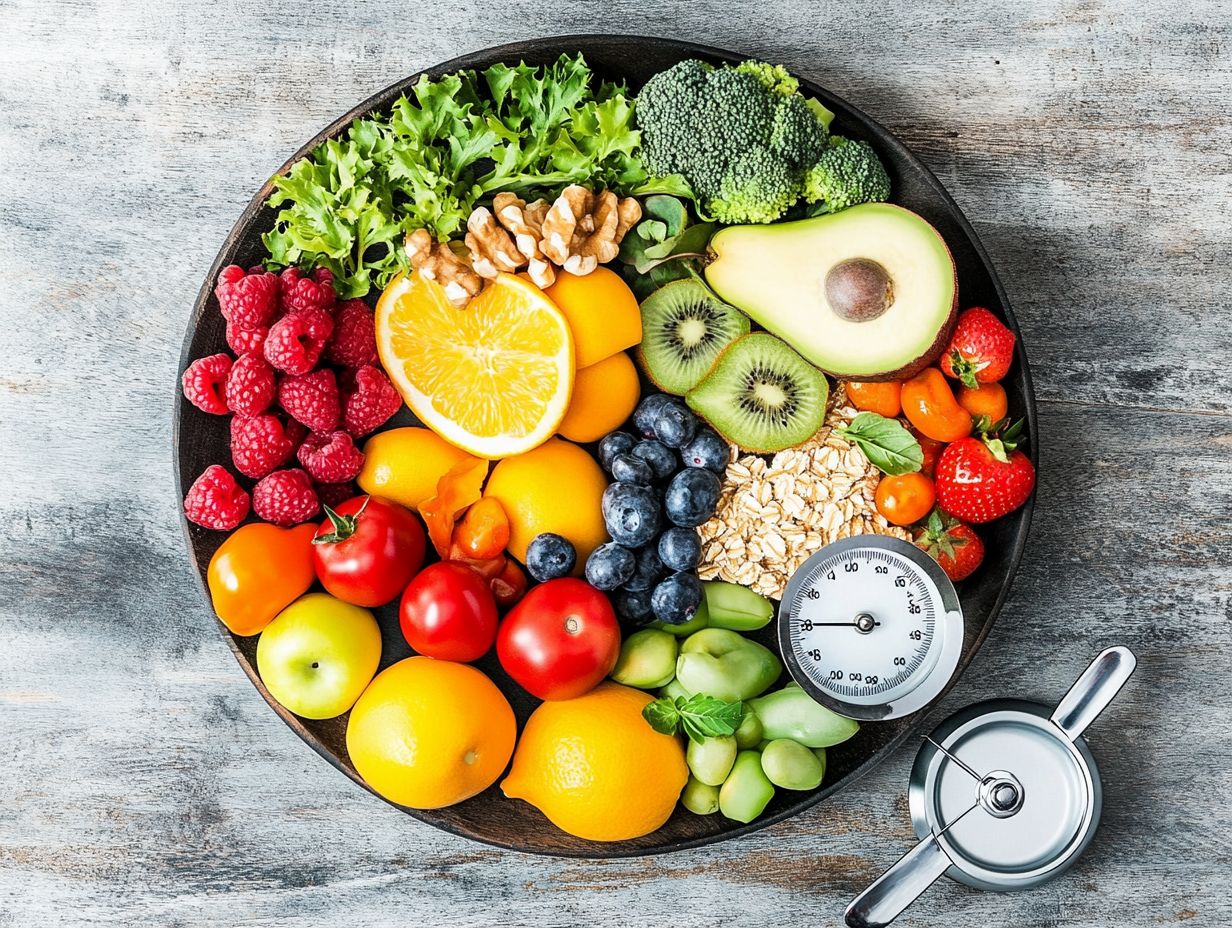
Leptin and ghrelin are vital hormones that play significant roles in your body s hunger and satiety control.
Leptin, often dubbed the satiety hormone, is produced by your body s fat tissue. It serves as an important messenger to your brain, signaling that you have enough energy stored, which helps reduce your appetite.
In contrast, ghrelin, known as the hunger hormone, is released mainly by your stomach. This hormone acts as a potent appetite stimulant, sending signals that trigger feelings of hunger.
Together, these hormones maintain a delicate balance that regulates your food intake and energy expenditure. Their interactions are crucial for your weight loss efforts and overall nutrition.
Understanding how they work offers valuable insights into managing obesity and metabolic disorders through hormonal regulation.
Factors Affecting Satiety
Several factors influence your satiety, including the dietary components you choose, your habitual eating patterns, and the energy density of the foods you consume. Energy density refers to the number of calories in a given weight of food.
Each of these elements plays a unique role in shaping your feelings of fullness and your overall caloric intake.
Dietary Components and Habits
Dietary components rich in protein and fiber enhance satiety and foster healthier eating habits.
Incorporating foods like legumes, whole grains, and lean meats into your meals helps you achieve and maintain a satisfying feeling of fullness throughout the day.
It s essential to grasp the concept of energy density; foods high in water or fiber, such as fruits and vegetables, provide fewer calories while delivering greater satisfaction.
Varying your meal choices adds excitement to your diet and ensures you get a broader range of nutrients, contributing to longer-lasting fullness.
This delightful variety can stave off boredom and motivate you to adhere to healthier eating patterns over time.
Ways to Increase Satiety
You can enhance your feelings of fullness through various nutrition and lifestyle strategies.
By doing so, you cultivate healthier eating habits and support your weight management efforts.
Nutrition and Lifestyle Strategies
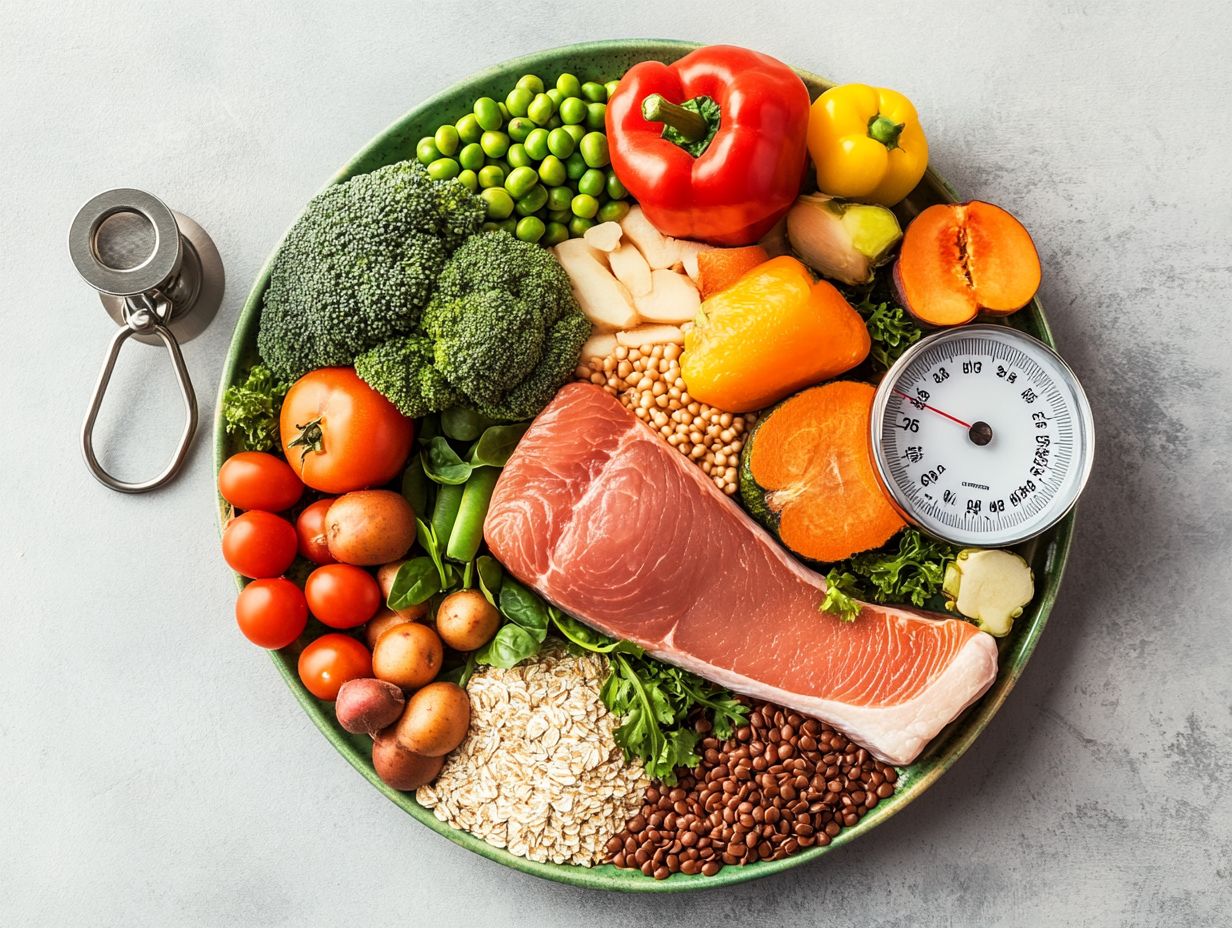
Effective nutrition and lifestyle strategies greatly enhance your sense of satiety, powering you to maintain a healthy weight and avoid the pitfalls of overeating.
By focusing on incorporating high-satiety foods like whole grains, lean proteins, and an abundance of fruits and vegetables into your meals, you can build a lasting sense of fullness.
Planning balanced diets that feature healthy fats, such as avocados and nuts, will further enhance this feeling.
Embracing lifestyle changes like mindful eating paying attention to your hunger and enjoying your food and regular physical activity supports your overall health and fosters a sustainable calorie deficit, making weight management more attainable in the long run.
The Connection Between Satiety and Weight Management
The relationship between satiety and weight management is vital; elevated satiety significantly enhances hunger control, ultimately shaping your weight loss and maintenance strategies.
Understanding this connection gives you the power to make informed choices that support your health goals.
Impact on Weight Loss and Maintenance
Satiety plays a pivotal role in your weight loss and maintenance journey, influencing how effectively you manage your caloric intake and control hunger. When you experience that satisfying sense of fullness, you’re far less likely to overindulge or give in to cravings, making it simpler to adhere to a reduced-calorie plan.
To achieve a sustainable calorie deficit, focus on incorporating high-fiber foods, protein-rich options, and healthy fats into your meals. These choices work together to promote lasting feelings of satiety.
Engaging in mindful eating practices like slowing down during meals and tuning into your hunger cues will further amplify that sense of fullness.
Once you reach your weight loss goals, staying proactive is essential! Make smart choices to keep your success alive by continuing thoughtful choices, staying active, and understanding your personal triggers. This approach ensures that satiety remains a steadfast ally in your ongoing health and fitness journey.
Frequently Asked Questions
What is satiety and why is it important to understand?
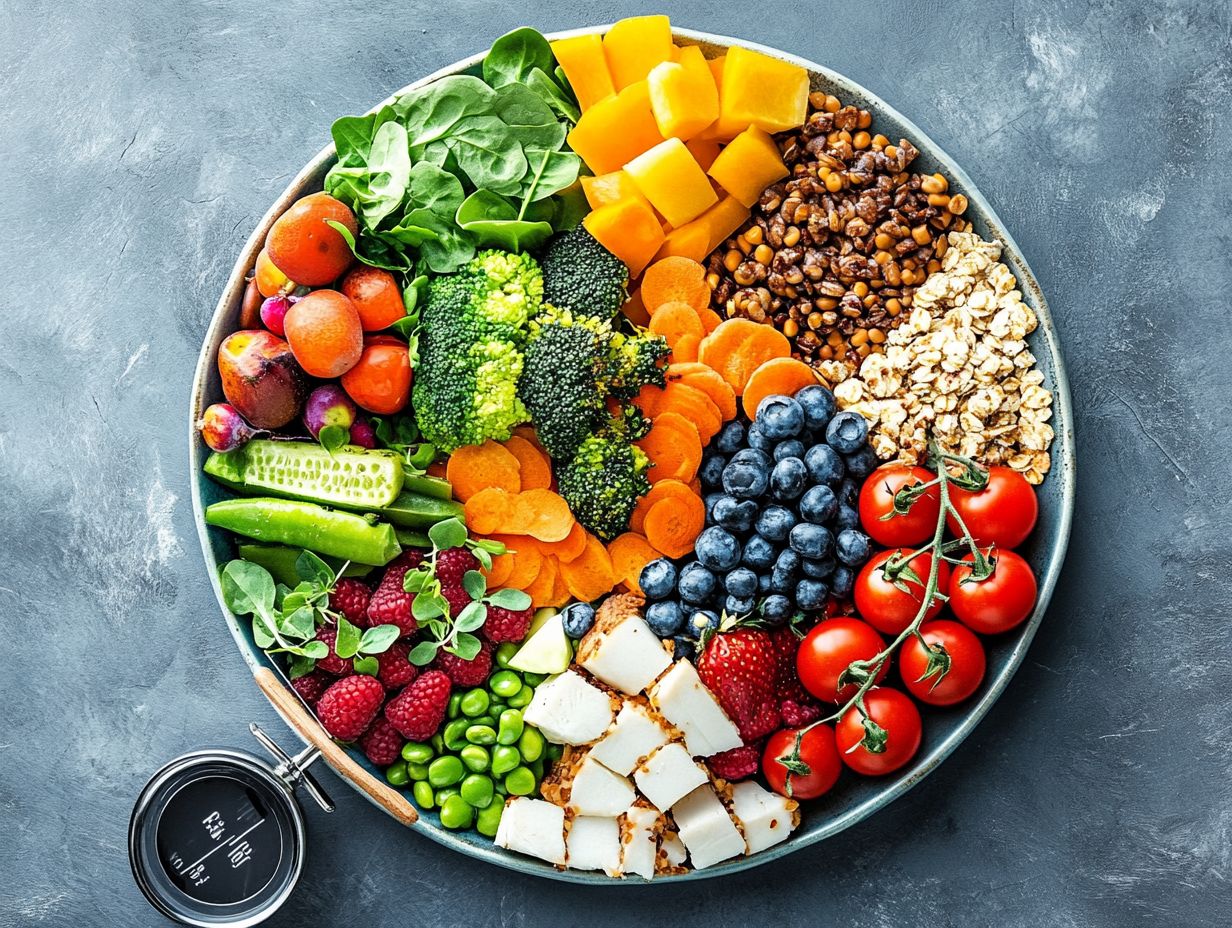
Satiety is the feeling of fullness and satisfaction after eating. It is important to understand because it impacts our food choices and overall health.
What are some factors that influence satiety?
Factors that influence satiety include the volume and nutrient density of food, hormones, and psychological factors like stress and emotions.
How does the brain play a role in satiety?
The brain has complex mechanisms that regulate satiety, including hormones and neural pathways. It can also be influenced by external factors like advertising and social cues.
Is there a difference between physical and psychological satiety?
Yes, physical satiety is the feeling of fullness in the stomach, while psychological satiety refers to the satisfaction and pleasure received from eating. Both are important for overall satiety.
Can certain foods increase satiety?
Yes, foods high in protein, fiber, and healthy fats can increase satiety. These foods take longer to digest and help us feel fuller for longer periods.
Start incorporating these strategies today for a healthier, happier you!
How Can Understanding the Science Behind Feeling Full Help with Weight Management?
Knowing what makes us feel full can help us choose better foods.
This can lead to less overeating and support weight management.

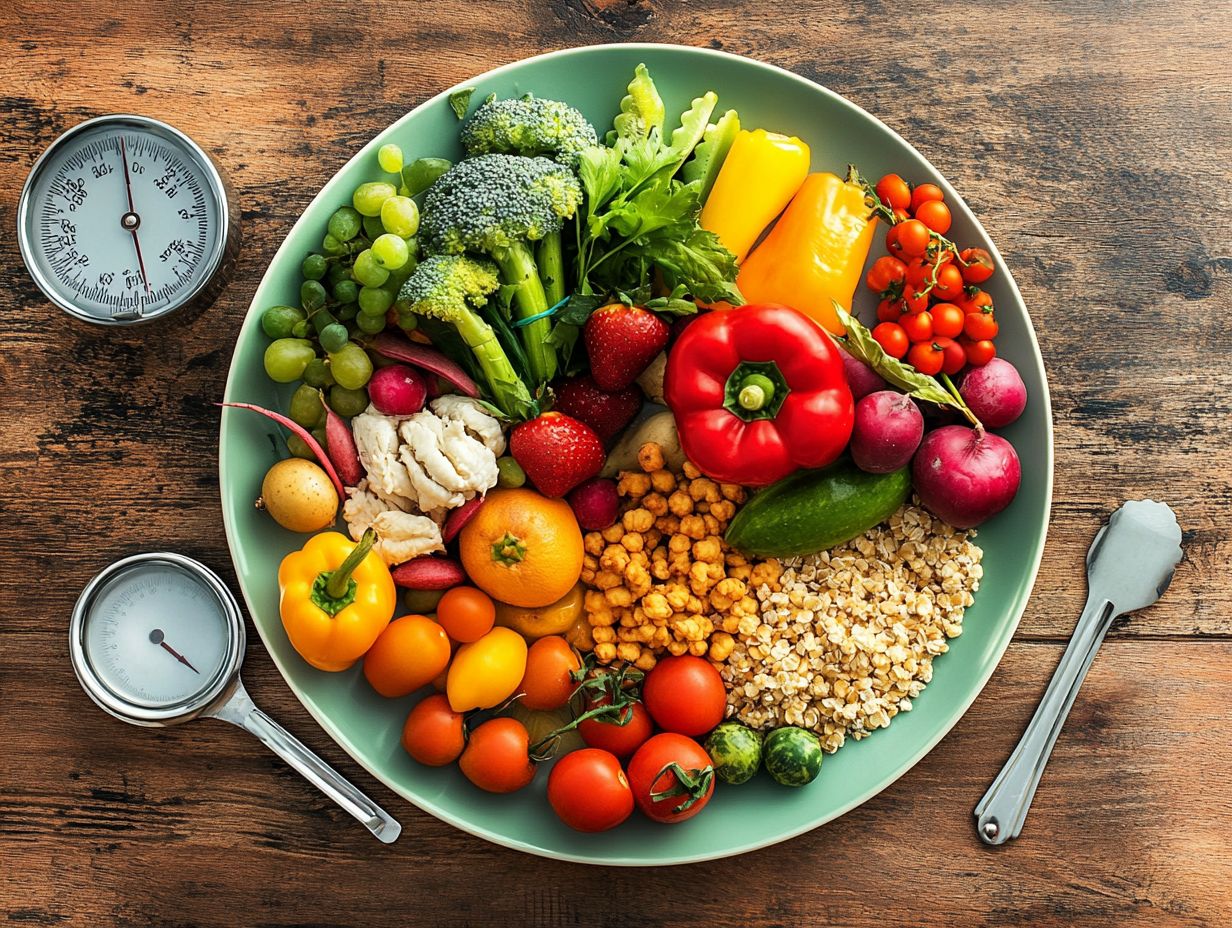 Satiety is the feeling of fullness and satisfaction after eating, and is important for weight management.
Satiety is the feeling of fullness and satisfaction after eating, and is important for weight management.

